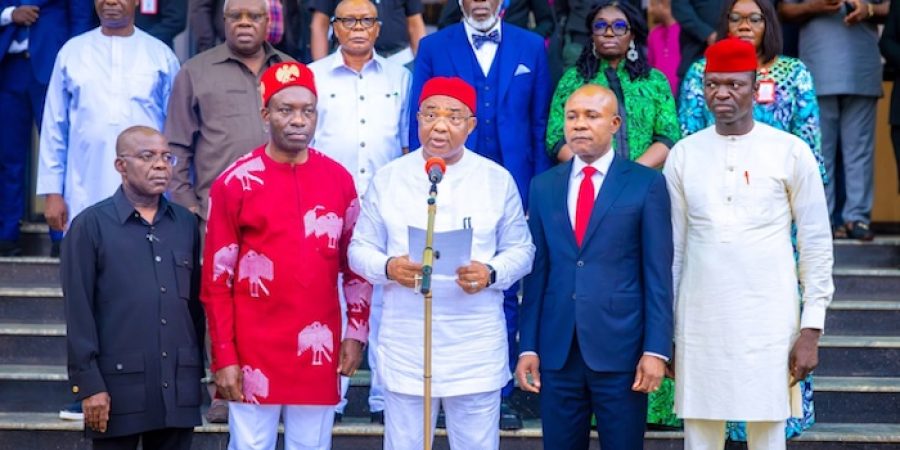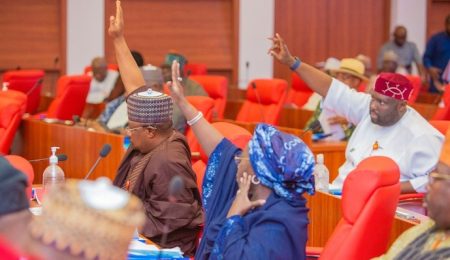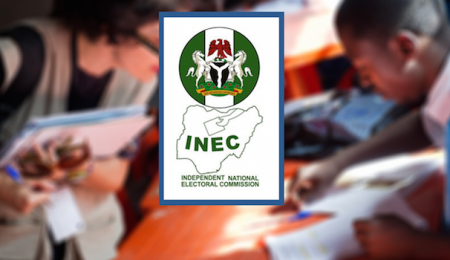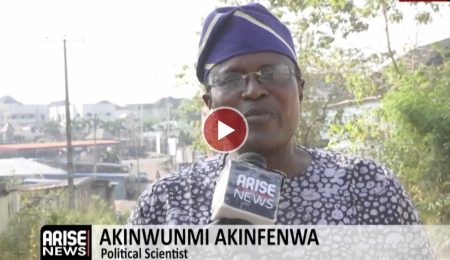The Imo State Governor, Hope Uzodimma, has said that the five states that make up the South-East geo-political zone have clear expectations regarding the proposals in the ongoing 1999 Constitution review by the National Assembly, insisting that the zone requires at least two more states.
Also, Governor Alex Otti of Abia State emphasised that the ongoing 2025 Constitution Review offers Nigerians a significant chance to critically examine the current system and decide on necessary changes to guide the country towards progress.
The two governors stated this in their remarks at the South-east Zonal public hearing for Imo and Abia states on the Constitution Review held in Owerri, the Imo State capital, on Saturday.
According to Uzodimma, the South-east remains the only zone with five states, underscoring the need for at least two additional states in the region.
He said, “Every other zone has six or more. This imbalance has led to underrepresentation in critical national institutions, from the National Assembly to the Federal Executive Council. It has shrunk our voice and abridged our inclusivity. “Therefore, it’s only fair and just that we ask for the creation of at least two additional states in the South-east.
“It is my well-considered submission that Anim State should be one of the new states to be created. This is one state that will have an oil-producing status upon creation.
“This makes it commercially viable, with a sufficient revenue base to sustain itself.
“This should naturally go hand-in-hand with the creation of new local government areas for the zone.”
The governor noted that “Until a few years ago, Owerri served as the capital of us all. Today, we have Umuahia and Abakaliki as the capitals of the new states.
“Through our collective efforts, perhaps, we shall soon have more state capitals like Orlu, Aba, Nsukka, and more.
“I believe that this is the prayer of the entire South-east, and it shall come to pass by the grace of God”.
He also made a case for a constitutional amendment to pave the way for rotational presidency, not along the North–South divide, but along the six established geo-political zones.
He continued, “This is not about tokenism but national stability. “Already, zoning has helped calm nerves over federal appointments. If Nigerians know that the presidency will rotate among the six zones, it will remove the fear of domination and deepen the sense of inclusion in the country.
“In addition, the time has come for us to take decisive steps on state police. The current centralised policing structure is overstretched and often disconnected from local realities.
“As the Chairman of the Progressive Governors’ Forum, I can confirm that we support the decentralisation of the police for greater responsiveness and effectiveness.
“The fear that governors will misuse such a force is unfounded and frankly outdated.
“We cannot allow the past to paralyse the future when our citizens are crying out for safety and order at the grassroots.”
On his part, Governor Otti has emphasised that the ongoing 2025 Constitution Review offers Nigerians a significant chance to critically examine the current system and decide on necessary changes to guide the country towards progress.
He made this statement during his address at the South-east Zonal Constitution Review meeting for Abia and Imo States, held in Owerri, organised by the House Committee on Constitution Review.
Governor Otti, who was represented by his deputy, Ikechukwu Emetu, stressed that regardless of political or other personal beliefs, Nigeria belongs to all its citizens and they must take responsibility for its future rather than relying on others abroad.
He acknowledged that Nigeria may not yet be the ideal nation its citizens dream of, but pointed out that history teaches nothing is irreversible, implying positive change is always possible.
Otti stressed that meaningful change requires an environment free of cynicism, passivity, and mistrust.
“Nigerians need to regain faith in their identity as a community with a rich national heritage and potential.”
He shared his personal views on key topics for debate in the constitutional review, noting that these ideas have been part of his public discourse for over a decade.
He welcomed differing opinions from other stakeholders, emphasising inclusive participation through the public hearing platform.
Regarding the proposal to create 31 additional states, Otti acknowledged the reasons behind such calls, mainly addressing marginalisation and exclusion of ethnic and religious groups in the current 36-state structure.
He expressed concern about the financial burden and administrative bloat these new states would impose on Nigeria’s already limited resources, doubting the feasibility of funding new states without new revenue streams, thus not sharing the optimism of proponents.
Otti recommended developing inclusive governance models within existing states that ensure all major clans have a voice in resource allocation, decision-making, and advancement of their political and economic interests.
He urged Nigerians to prioritise improving state economic structures, generating jobs for youth outside of government employment, and focusing on the welfare of the common people.
On state police, Otti identified the current exclusive federal policing system as inadequate and exposing citizens to vulnerabilities.
He strongly supported the creation of state police forces but insisted on clear standards regarding leadership, relations with federal police, recruitment, accountability, and human rights.
Adedayo Akinwale and Juliet Akoje
Follow us on:



